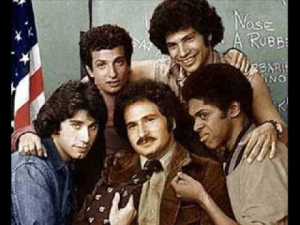Having cancer often gives me cause for reflection. Sometimes, in grief and melancholy, but other times in joy and delight. I grieved that I would never see grandchildren, and now four of them bring us enormous blessing. I lamented the loss of ministry experience, and God has opened doors that I didn’t even know existed. I’ve learned how easy it is to take life for granted, and God has given me a renewed delight in so many of the simple things in life. Let me reflect on a thread that has been woven through my life.
I’m going to take you on a ride through some back roads of my nostalgia. It’s 40 years since I gained my motorcycle license and rushed out to purchase a second hand, blue Honda CB250. It didn’t go very fast and that wasn’t such a bad thing. It was my first vehicle and it gave me some independence. It took me to school, to friends’ houses, to the rugby, to job interviews, on some weekend rides around the Cotter-Tidbinbilla loop outside Canberra, and it got me praying. Dear God, help me stay alive. In case I don’t make it home tonight, please forgive me for all the bad stuff I did today.
But I need to go back a few steps.
My introduction to motorbikes began much earlier when I was 9 years old in Tasmania. My best mate, Vaughan, had a Daytona 60 and we’d ride it on his property and on tracks near the Gorge in Launceston. It was awesome to get on a bike that ‘went by itself’. You didn’t have to pedal. You just had to learn how to not fall off and then how to stop. A few of my friends had motorbikes. Me? I didn’t even have a push bike. We lived on a steep hill and bikes were considered far too dangerous.

We moved to Canberra in 1975 and, again, many of my friends had motorbikes. My Grandpa gave me the money for my first bike. It was a Malvern Star Skidstar GT, with twin halogen headlights, 3 speed shift, speedo, and chrome mudguards. The only thing it didn’t have was an engine. Mind you, I did crank it out to 80 km/h going flat out down the road from Mt Ainslie. I wish I still had it—apparently they are collectors’ items.
Some of my mates had trail bikes and they’d ride the fire trails of Mt Majura before they were old enough to get their licenses. It was on one of these, when I was 12 years of age that I rode for the first time on a ‘proper’ motorcycle, with gears and a clutch. My friend, Paul, would double me to the forest and then let me take turns in riding. Once I got the hang of it, I was hooked.
I loved the look and feel of bikes. My Bible study leader rode a WLA war model Harley Davidson. It was camo green, had hand gears, a foot clutch, and was sometimes working. I loved checking it out whenever he rode it to church. My good friend, David, bought himself a Honda CB250 road bike—the same one I was to purchase later from a dealer in Braddon. Another friend from church, Jack, who worked for the Canberra Times, had two Moto Guzzi Californians—and in later years we would go on some long trips together.
My friend Ross, who was a theological student, had some amazing bikes. He’d race them, customise them, drag them, and do outrageous things on them. My favourite was a Yamaha 650 that was semi-chopped, airbrushed, and had the sweetest exhaust sound I’d ever heard. I don’t think I knew what a theological student was. It had something to do with studying the Bible and becoming a minister. My dad was a minister, but he didn’t drag race Kawasaki 1000s!
 During high school I met John Smith and other members of the Gods Squad Christian Motorcycle Club. We had John and other Squad guys visit or stay in our home at different times. I admired their passion for Jesus, their support for the disadvantaged and the marginalised, and their guts in reaching out among outlaw bikers, such as the Hells Angels MC. It was during one of the Squad visits to Canberra that my whole outlook on life changed. I decided that I wanted to work among people, to reach out to those who are doing it tough, to share Jesus with others (and maybe one day to ride a Ducati or a Harley Davidson!) I wanted to quit school immediately and become a youth worker. The problem was I was only 17 and I needed to spend some time growing up and working out my life and faith. I’d grown up in a Christian home, but I needed some independence to work out what I really believed for myself.
During high school I met John Smith and other members of the Gods Squad Christian Motorcycle Club. We had John and other Squad guys visit or stay in our home at different times. I admired their passion for Jesus, their support for the disadvantaged and the marginalised, and their guts in reaching out among outlaw bikers, such as the Hells Angels MC. It was during one of the Squad visits to Canberra that my whole outlook on life changed. I decided that I wanted to work among people, to reach out to those who are doing it tough, to share Jesus with others (and maybe one day to ride a Ducati or a Harley Davidson!) I wanted to quit school immediately and become a youth worker. The problem was I was only 17 and I needed to spend some time growing up and working out my life and faith. I’d grown up in a Christian home, but I needed some independence to work out what I really believed for myself.
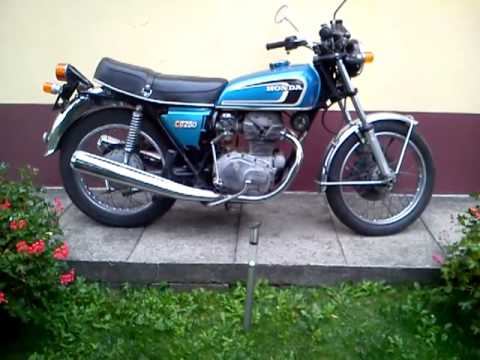 That same year I bought the CB250. I’d saved enough to buy the bike through working on a milk run after school. I’m not sure how my mother agreed, but she did. Dad and I went to the shop and I purchased the bike. I bought some boots, gloves, Barbour oilskins, and conceded to buying a bright yellow helmet. I stuck a cross on the back with electrical tape and then I spray painted the helmet metallic blue, leaving a bright yellow cross. I’m not sure why I did it, but it probably had something to do with working out my identity.
That same year I bought the CB250. I’d saved enough to buy the bike through working on a milk run after school. I’m not sure how my mother agreed, but she did. Dad and I went to the shop and I purchased the bike. I bought some boots, gloves, Barbour oilskins, and conceded to buying a bright yellow helmet. I stuck a cross on the back with electrical tape and then I spray painted the helmet metallic blue, leaving a bright yellow cross. I’m not sure why I did it, but it probably had something to do with working out my identity.
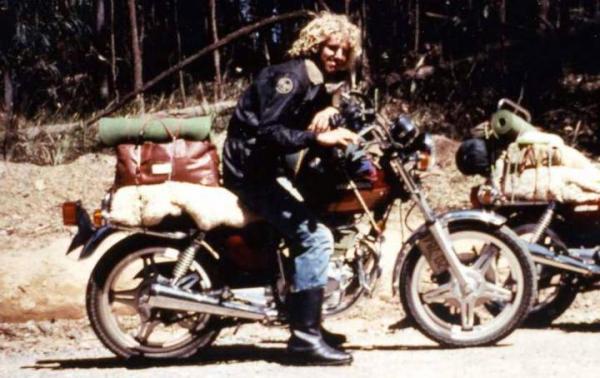 Later in the same year I got a labouring job in the outer suburbs of Canberra. I’d start work at 7am and decided that I needed a reliable bike to get me to and from our worksites. My next purchase was a burgundy Honda CB400 twin. It was smoother, faster, and leaked less oil than the 250. This was a bike that would take me places—rides along the Kings Highway, up and down the Clyde, camping at North Durras or Burrill Pines. It was powerful enough to carry a load, but laboured a bit when doubling a friend. It would become my means of transport between Canberra and Sydney, where I’d moved to commence a Social Work degree at UNSW.
Later in the same year I got a labouring job in the outer suburbs of Canberra. I’d start work at 7am and decided that I needed a reliable bike to get me to and from our worksites. My next purchase was a burgundy Honda CB400 twin. It was smoother, faster, and leaked less oil than the 250. This was a bike that would take me places—rides along the Kings Highway, up and down the Clyde, camping at North Durras or Burrill Pines. It was powerful enough to carry a load, but laboured a bit when doubling a friend. It would become my means of transport between Canberra and Sydney, where I’d moved to commence a Social Work degree at UNSW.
 University gave me the independence I needed to force a crisis of beliefs. I’d left home—would I leave my faith behind, or would I see it grow into maturity? I thank God for surrounding me with friends who were serious about following Jesus. They opened the Bible and expected it to make sense. They saw Jesus as the key to meaning, life, and the future. I learned that I could be forgiven for everything, because the death of Jesus had paid it all. Being Christian wasn’t about being good enough to be accepted by God, it was about God accepting me because Jesus dealt with all my sin on that first Good Friday. During these years I also became loosely involved with the Brotherhood CMC. They were similar to the Gods Squad, based in Sydney’s west, with an outreach to the marginalised. I’d considered applying to become a patched member, but I didn’t go ahead with it, and I realise now that my heart wasn’t in the right place.
University gave me the independence I needed to force a crisis of beliefs. I’d left home—would I leave my faith behind, or would I see it grow into maturity? I thank God for surrounding me with friends who were serious about following Jesus. They opened the Bible and expected it to make sense. They saw Jesus as the key to meaning, life, and the future. I learned that I could be forgiven for everything, because the death of Jesus had paid it all. Being Christian wasn’t about being good enough to be accepted by God, it was about God accepting me because Jesus dealt with all my sin on that first Good Friday. During these years I also became loosely involved with the Brotherhood CMC. They were similar to the Gods Squad, based in Sydney’s west, with an outreach to the marginalised. I’d considered applying to become a patched member, but I didn’t go ahead with it, and I realise now that my heart wasn’t in the right place.
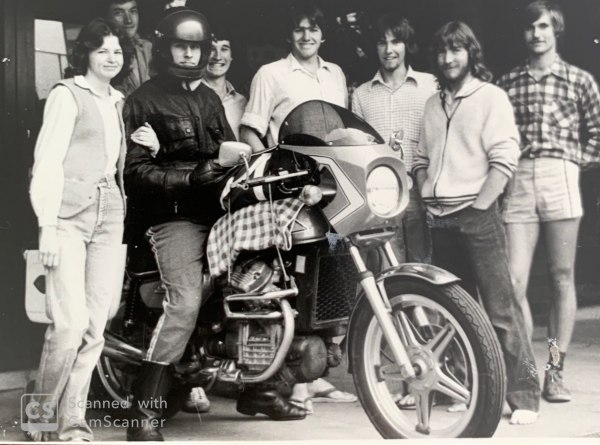 They say the ideal bike is the one that is just a bit bigger than the one you’ve got. I’d started to take a couple of my best friends, Fiona and Barry, on rides to different places. Fiona’s brother lived in Wollongong and I’d take her for visits to his family. I’d say, let’s ride to the Gong for a hamburger on Friday nights. The truth is we visited a Christian outreach called ‘The Hamburger Hut’ in Fairymeadow. We’d meet interesting people who surfed, rode bikes, did fun stuff, but significantly wanted to share how good God is. The CB400 soon got replaced by a blue Honda CX500 Shadow. It was a super-comfortable, shaft-driven, V-twin. It was the ideal tourer and was loads of fun in the twists and turns. I’d take it everywhere—to and from Canberra, even in the cold of winter; along the Great Ocean Road; outback NSW to Narrabri and West Wyalong; to and from Wollongong via the Royal National Park.
They say the ideal bike is the one that is just a bit bigger than the one you’ve got. I’d started to take a couple of my best friends, Fiona and Barry, on rides to different places. Fiona’s brother lived in Wollongong and I’d take her for visits to his family. I’d say, let’s ride to the Gong for a hamburger on Friday nights. The truth is we visited a Christian outreach called ‘The Hamburger Hut’ in Fairymeadow. We’d meet interesting people who surfed, rode bikes, did fun stuff, but significantly wanted to share how good God is. The CB400 soon got replaced by a blue Honda CX500 Shadow. It was a super-comfortable, shaft-driven, V-twin. It was the ideal tourer and was loads of fun in the twists and turns. I’d take it everywhere—to and from Canberra, even in the cold of winter; along the Great Ocean Road; outback NSW to Narrabri and West Wyalong; to and from Wollongong via the Royal National Park.
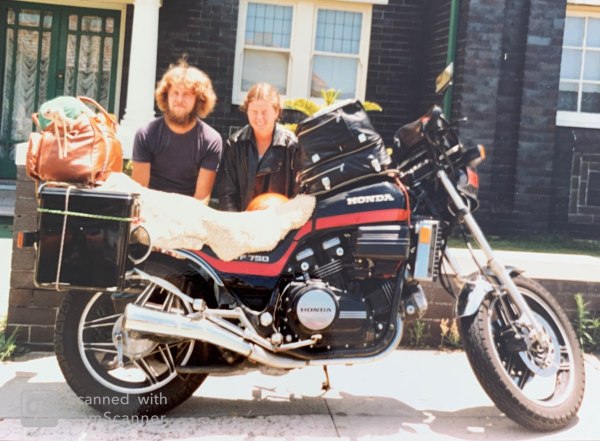 Somewhere along the line the blue CX500 was traded in on a newer black CX500. It was one of the nicest bikes I’ve ridden, but I didn’t keep it long. Fiona and I were getting married, so we opted to replace the bike with a 1974 Corolla and then a Datsun 180B SSS, so that we’d have a vehicle that we could both use. We temporarily swapped our Datsun for a Honda VF750/4 for ‘part two’ of our honeymoon.
Somewhere along the line the blue CX500 was traded in on a newer black CX500. It was one of the nicest bikes I’ve ridden, but I didn’t keep it long. Fiona and I were getting married, so we opted to replace the bike with a 1974 Corolla and then a Datsun 180B SSS, so that we’d have a vehicle that we could both use. We temporarily swapped our Datsun for a Honda VF750/4 for ‘part two’ of our honeymoon.
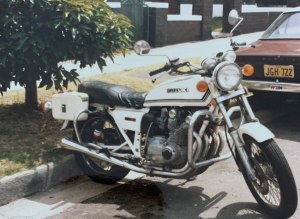 After we were married I started working in a Christian ministry apprenticeship based in the Eastern Suburbs around UNSW. Fiona had her medical training to finish and life became a little frantic. I had an ex-police model, white Suzuki 750, with almost no suspension, during this time.
After we were married I started working in a Christian ministry apprenticeship based in the Eastern Suburbs around UNSW. Fiona had her medical training to finish and life became a little frantic. I had an ex-police model, white Suzuki 750, with almost no suspension, during this time.
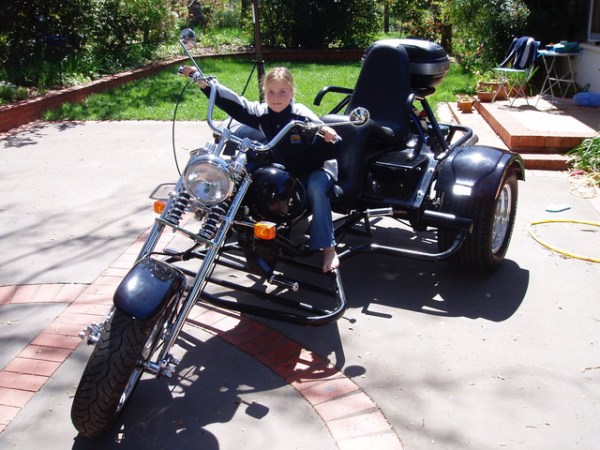 After four more years in Sydney and completing theological training, we left to start ministry in Canberra. In the busy years of raising four kids, we decided that I wouldn’t continue riding much, other than occasional times when someone might lend me a bike (or even an OzTrike) while they were away on holidays!
After four more years in Sydney and completing theological training, we left to start ministry in Canberra. In the busy years of raising four kids, we decided that I wouldn’t continue riding much, other than occasional times when someone might lend me a bike (or even an OzTrike) while they were away on holidays!
 At one point I purchased an ‘almost restored’ Moto Morini 3½. It was a collector’s item and now resides at the National Motorcycle Museum in Nabiac. Now that I’m nearby, I must pay it a visit sometime soon.
At one point I purchased an ‘almost restored’ Moto Morini 3½. It was a collector’s item and now resides at the National Motorcycle Museum in Nabiac. Now that I’m nearby, I must pay it a visit sometime soon.
 A highlight of my motorcycling experience was when Fiona arranged for me to have a Harley for 24 hours as a gift for my 50th birthday. It seems bizarre when I look back on it. I was 9 months into my cancer journey and still pretty weak and frail. Here I was dodging the effects of chemotherapy and Fiona arranged for me to ride a 350 kg Harley Davidson with her on the back. That is trust for you! I marvel that I could even hold the thing up, and we rode it for more than 300km through country NSW.
A highlight of my motorcycling experience was when Fiona arranged for me to have a Harley for 24 hours as a gift for my 50th birthday. It seems bizarre when I look back on it. I was 9 months into my cancer journey and still pretty weak and frail. Here I was dodging the effects of chemotherapy and Fiona arranged for me to ride a 350 kg Harley Davidson with her on the back. That is trust for you! I marvel that I could even hold the thing up, and we rode it for more than 300km through country NSW.
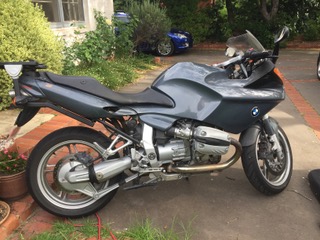 As my cancer seemed to disappear, and I had no evidence of disease, I considered getting another bike. A good friend gifted me his BMW R1100S. He was very generous and it was such a treat. I remember the feeling of being alive as I started to regain confidence on the bike. But I owned this bike for a little more than two months, before it was stolen from our backyard and we never saw it again. The Lord gave and the Lord has taken away; may the name of the Lord be praised.
As my cancer seemed to disappear, and I had no evidence of disease, I considered getting another bike. A good friend gifted me his BMW R1100S. He was very generous and it was such a treat. I remember the feeling of being alive as I started to regain confidence on the bike. But I owned this bike for a little more than two months, before it was stolen from our backyard and we never saw it again. The Lord gave and the Lord has taken away; may the name of the Lord be praised.
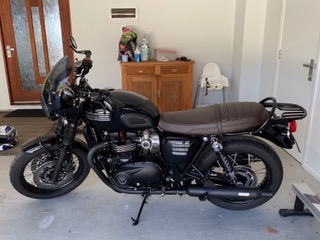 And, so, to now. We are living in a beachside town, with awesome scenery and some nice roads. Every Sunday we watch a steady stream of bikes going backwards and forwards on the coastal stretch in front of our house. Earlier this year I test rode a Triumph Bonneville T120. It handled nicely, looked great, and sounded awesome. I took Fiona on the back and we explored some country roads.
And, so, to now. We are living in a beachside town, with awesome scenery and some nice roads. Every Sunday we watch a steady stream of bikes going backwards and forwards on the coastal stretch in front of our house. Earlier this year I test rode a Triumph Bonneville T120. It handled nicely, looked great, and sounded awesome. I took Fiona on the back and we explored some country roads.
But there was a problem—the pain I felt afterwards. Fiona didn’t find it very comfortable either. After a few days of riding, my back was in such pain, my ribs were so sore, and I remember saying to Fiona that I must be getting too old to ride. I needed some physio, but the massages just seemed to make it worse. After a dozen sessions trying to get my back and chest right, nothing seemed to work.
It turns out that the problem wasn’t riding motorbikes, nor this particular bike. It was the recurrence of the lung cancer. Tumours had been slowly regrowing in my left lung, and activities like motorcycling caused the pain to flair up. Now that I’m back on treatment again, my pains have all but gone. And I’ve now purchased a bike and I’m loving riding it. A commute to town has become a joy rather than a chore. Fiona has ridden with me. We’ve done a few winding roads, climbed a couple of mountains, and found a café with a view worth lingering over. We’ve been thoroughly drenched in the rain. We’ve enjoyed the sun and the wind. And we’ve done it together, like we did so long ago.
Is it safe? No, it’s not ‘safe’—but we can be and will be careful. We’ll dress safely, stay alert, and look out for trouble. I would like to do an advanced rider’s course. I will assume that we are invisible and take precautions.
Lately, I’ve been praying when I ride—not just for our safety, but I thank God for life and the feeling of being alive. And I pray for others—for some bikers I’ve met, for some neighbours who’ve lost their wives or husband, for my friends with cancer, for our little church at Salt, for my family, for my friends, for some people who are doing it tough right now.
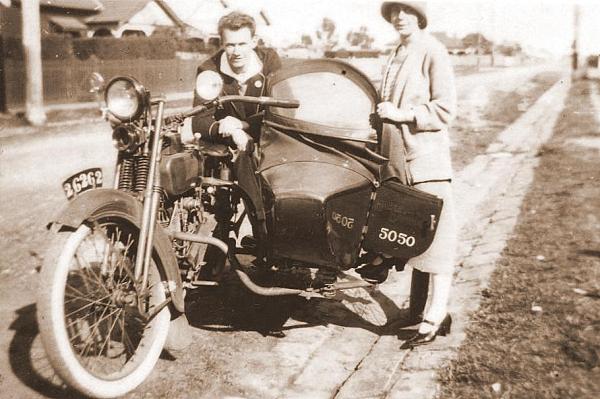 What motorcycle did I get? Well, let me say, it runs in the family. My grandfather, Dave McDonald, had a Harley before my father was born. Grandpa and Grandma brought my newborn dad home from the hospital in the sidecar in 1935. What can I say? Perhaps I have another genetic mutation!
What motorcycle did I get? Well, let me say, it runs in the family. My grandfather, Dave McDonald, had a Harley before my father was born. Grandpa and Grandma brought my newborn dad home from the hospital in the sidecar in 1935. What can I say? Perhaps I have another genetic mutation!
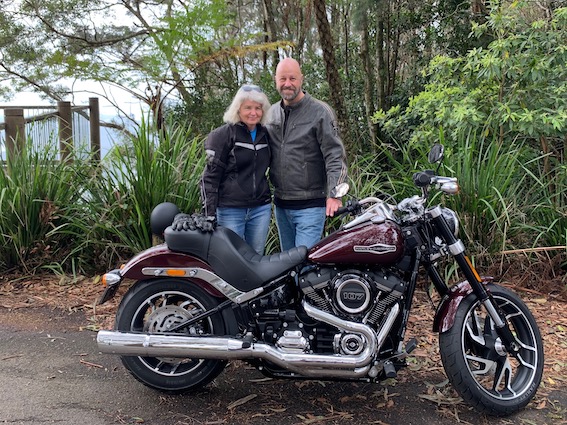 Last month, I picked up a Harley Davidson. It’s a little more sophisticated than its forbear. It chugs along pretty well. It’s a cruiser, a bike for old blokes. It’s low to the ground and easy to get on and off. It looks good naked (the bike, not me); and it has saddle bags, a comfy seat for Fiona, and a windshield to clip on for longer trips.
Last month, I picked up a Harley Davidson. It’s a little more sophisticated than its forbear. It chugs along pretty well. It’s a cruiser, a bike for old blokes. It’s low to the ground and easy to get on and off. It looks good naked (the bike, not me); and it has saddle bags, a comfy seat for Fiona, and a windshield to clip on for longer trips.
It’s opening new opportunities with people, we are making new friends, and I’m getting opportunities to share the love of Jesus with others. There are a few riders in our church, and there seems to be many bikers in our community. I’ve become friends with a Harley rider who is only alive today because of a lung transplant, who knows what it is to be given new life.
Eric Liddell, from Chariots of Fire, said that when he ran he felt God’s pleasure. I can say something pretty similar. Thank you God for the joy of riding.
 It’s more than 10 years since my cancer diagnosis. During this time some of my friends have passed away from cancer. I don’t have an answer for why I’m here and others are not. But there is a temptation to build our theology of God based on our experiences. I heard one woman say she could no longer believe in God, because she prayed for her sister and her sister died. Others have been drawn to God through their experience of healing.
It’s more than 10 years since my cancer diagnosis. During this time some of my friends have passed away from cancer. I don’t have an answer for why I’m here and others are not. But there is a temptation to build our theology of God based on our experiences. I heard one woman say she could no longer believe in God, because she prayed for her sister and her sister died. Others have been drawn to God through their experience of healing.

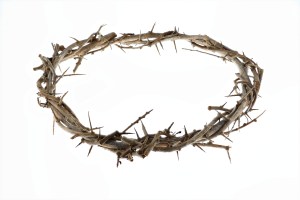

 During high school I met John Smith and other members of the Gods Squad Christian Motorcycle Club. We had John and other Squad guys visit or stay in our home at different times. I admired their passion for Jesus, their support for the disadvantaged and the marginalised, and their guts in reaching out among outlaw bikers, such as the Hells Angels MC. It was during one of the Squad visits to Canberra that my whole outlook on life changed. I decided that I wanted to work among people, to reach out to those who are doing it tough, to share Jesus with others (and maybe one day to ride a Ducati or a Harley Davidson!) I wanted to quit school immediately and become a youth worker. The problem was I was only 17 and I needed to spend some time growing up and working out my life and faith. I’d grown up in a Christian home, but I needed some independence to work out what I really believed for myself.
During high school I met John Smith and other members of the Gods Squad Christian Motorcycle Club. We had John and other Squad guys visit or stay in our home at different times. I admired their passion for Jesus, their support for the disadvantaged and the marginalised, and their guts in reaching out among outlaw bikers, such as the Hells Angels MC. It was during one of the Squad visits to Canberra that my whole outlook on life changed. I decided that I wanted to work among people, to reach out to those who are doing it tough, to share Jesus with others (and maybe one day to ride a Ducati or a Harley Davidson!) I wanted to quit school immediately and become a youth worker. The problem was I was only 17 and I needed to spend some time growing up and working out my life and faith. I’d grown up in a Christian home, but I needed some independence to work out what I really believed for myself. That same year I bought the CB250. I’d saved enough to buy the bike through working on a milk run after school. I’m not sure how my mother agreed, but she did. Dad and I went to the shop and I purchased the bike. I bought some boots, gloves, Barbour oilskins, and conceded to buying a bright yellow helmet. I stuck a cross on the back with electrical tape and then I spray painted the helmet metallic blue, leaving a bright yellow cross. I’m not sure why I did it, but it probably had something to do with working out my identity.
That same year I bought the CB250. I’d saved enough to buy the bike through working on a milk run after school. I’m not sure how my mother agreed, but she did. Dad and I went to the shop and I purchased the bike. I bought some boots, gloves, Barbour oilskins, and conceded to buying a bright yellow helmet. I stuck a cross on the back with electrical tape and then I spray painted the helmet metallic blue, leaving a bright yellow cross. I’m not sure why I did it, but it probably had something to do with working out my identity. Later in the same year I got a labouring job in the outer suburbs of Canberra. I’d start work at 7am and decided that I needed a reliable bike to get me to and from our worksites. My next purchase was a burgundy Honda CB400 twin. It was smoother, faster, and leaked less oil than the 250. This was a bike that would take me places—rides along the Kings Highway, up and down the Clyde, camping at North Durras or Burrill Pines. It was powerful enough to carry a load, but laboured a bit when doubling a friend. It would become my means of transport between Canberra and Sydney, where I’d moved to commence a Social Work degree at UNSW.
Later in the same year I got a labouring job in the outer suburbs of Canberra. I’d start work at 7am and decided that I needed a reliable bike to get me to and from our worksites. My next purchase was a burgundy Honda CB400 twin. It was smoother, faster, and leaked less oil than the 250. This was a bike that would take me places—rides along the Kings Highway, up and down the Clyde, camping at North Durras or Burrill Pines. It was powerful enough to carry a load, but laboured a bit when doubling a friend. It would become my means of transport between Canberra and Sydney, where I’d moved to commence a Social Work degree at UNSW. University gave me the independence I needed to force a crisis of beliefs. I’d left home—would I leave my faith behind, or would I see it grow into maturity? I thank God for surrounding me with friends who were serious about following Jesus. They opened the Bible and expected it to make sense. They saw Jesus as the key to meaning, life, and the future. I learned that I could be forgiven for everything, because the death of Jesus had paid it all. Being Christian wasn’t about being good enough to be accepted by God, it was about God accepting me because Jesus dealt with all my sin on that first Good Friday. During these years I also became loosely involved with the Brotherhood CMC. They were similar to the Gods Squad, based in Sydney’s west, with an outreach to the marginalised. I’d considered applying to become a patched member, but I didn’t go ahead with it, and I realise now that my heart wasn’t in the right place.
University gave me the independence I needed to force a crisis of beliefs. I’d left home—would I leave my faith behind, or would I see it grow into maturity? I thank God for surrounding me with friends who were serious about following Jesus. They opened the Bible and expected it to make sense. They saw Jesus as the key to meaning, life, and the future. I learned that I could be forgiven for everything, because the death of Jesus had paid it all. Being Christian wasn’t about being good enough to be accepted by God, it was about God accepting me because Jesus dealt with all my sin on that first Good Friday. During these years I also became loosely involved with the Brotherhood CMC. They were similar to the Gods Squad, based in Sydney’s west, with an outreach to the marginalised. I’d considered applying to become a patched member, but I didn’t go ahead with it, and I realise now that my heart wasn’t in the right place. They say the ideal bike is the one that is just a bit bigger than the one you’ve got. I’d started to take a couple of my best friends, Fiona and Barry, on rides to different places. Fiona’s brother lived in Wollongong and I’d take her for visits to his family. I’d say, let’s ride to the Gong for a hamburger on Friday nights. The truth is we visited a Christian outreach called ‘The Hamburger Hut’ in Fairymeadow. We’d meet interesting people who surfed, rode bikes, did fun stuff, but significantly wanted to share how good God is. The CB400 soon got replaced by a blue Honda CX500 Shadow. It was a super-comfortable, shaft-driven, V-twin. It was the ideal tourer and was loads of fun in the twists and turns. I’d take it everywhere—to and from Canberra, even in the cold of winter; along the Great Ocean Road; outback NSW to Narrabri and West Wyalong; to and from Wollongong via the Royal National Park.
They say the ideal bike is the one that is just a bit bigger than the one you’ve got. I’d started to take a couple of my best friends, Fiona and Barry, on rides to different places. Fiona’s brother lived in Wollongong and I’d take her for visits to his family. I’d say, let’s ride to the Gong for a hamburger on Friday nights. The truth is we visited a Christian outreach called ‘The Hamburger Hut’ in Fairymeadow. We’d meet interesting people who surfed, rode bikes, did fun stuff, but significantly wanted to share how good God is. The CB400 soon got replaced by a blue Honda CX500 Shadow. It was a super-comfortable, shaft-driven, V-twin. It was the ideal tourer and was loads of fun in the twists and turns. I’d take it everywhere—to and from Canberra, even in the cold of winter; along the Great Ocean Road; outback NSW to Narrabri and West Wyalong; to and from Wollongong via the Royal National Park. Somewhere along the line the blue CX500 was traded in on a newer black CX500. It was one of the nicest bikes I’ve ridden, but I didn’t keep it long. Fiona and I were getting married, so we opted to replace the bike with a 1974 Corolla and then a Datsun 180B SSS, so that we’d have a vehicle that we could both use. We temporarily swapped our Datsun for a Honda VF750/4 for ‘part two’ of our honeymoon.
Somewhere along the line the blue CX500 was traded in on a newer black CX500. It was one of the nicest bikes I’ve ridden, but I didn’t keep it long. Fiona and I were getting married, so we opted to replace the bike with a 1974 Corolla and then a Datsun 180B SSS, so that we’d have a vehicle that we could both use. We temporarily swapped our Datsun for a Honda VF750/4 for ‘part two’ of our honeymoon.
 After four more years in Sydney and completing theological training, we left to start ministry in Canberra. In the busy years of raising four kids, we decided that I wouldn’t continue riding much, other than occasional times when someone might lend me a bike (or even an OzTrike) while they were away on holidays!
After four more years in Sydney and completing theological training, we left to start ministry in Canberra. In the busy years of raising four kids, we decided that I wouldn’t continue riding much, other than occasional times when someone might lend me a bike (or even an OzTrike) while they were away on holidays! At one point I purchased an ‘almost restored’ Moto Morini 3½. It was a collector’s item and now resides at the National Motorcycle Museum in Nabiac. Now that I’m nearby, I must pay it a visit sometime soon.
At one point I purchased an ‘almost restored’ Moto Morini 3½. It was a collector’s item and now resides at the National Motorcycle Museum in Nabiac. Now that I’m nearby, I must pay it a visit sometime soon. A highlight of my motorcycling experience was when Fiona arranged for me to have a Harley for 24 hours as a gift for my 50th birthday. It seems bizarre when I look back on it. I was 9 months into my cancer journey and still pretty weak and frail. Here I was dodging the effects of chemotherapy and Fiona arranged for me to ride a 350 kg Harley Davidson with her on the back. That is trust for you! I marvel that I could even hold the thing up, and we rode it for more than 300km through country NSW.
A highlight of my motorcycling experience was when Fiona arranged for me to have a Harley for 24 hours as a gift for my 50th birthday. It seems bizarre when I look back on it. I was 9 months into my cancer journey and still pretty weak and frail. Here I was dodging the effects of chemotherapy and Fiona arranged for me to ride a 350 kg Harley Davidson with her on the back. That is trust for you! I marvel that I could even hold the thing up, and we rode it for more than 300km through country NSW. As my cancer seemed to disappear, and I had no evidence of disease, I considered getting another bike. A good friend gifted me his BMW R1100S. He was very generous and it was such a treat. I remember the feeling of being alive as I started to regain confidence on the bike. But I owned this bike for a little more than two months, before it was stolen from our backyard and we never saw it again.
As my cancer seemed to disappear, and I had no evidence of disease, I considered getting another bike. A good friend gifted me his BMW R1100S. He was very generous and it was such a treat. I remember the feeling of being alive as I started to regain confidence on the bike. But I owned this bike for a little more than two months, before it was stolen from our backyard and we never saw it again.  And, so, to now. We are living in a beachside town, with awesome scenery and some nice roads. Every Sunday we watch a steady stream of bikes going backwards and forwards on the coastal stretch in front of our house. Earlier this year I test rode a Triumph Bonneville T120. It handled nicely, looked great, and sounded awesome. I took Fiona on the back and we explored some country roads.
And, so, to now. We are living in a beachside town, with awesome scenery and some nice roads. Every Sunday we watch a steady stream of bikes going backwards and forwards on the coastal stretch in front of our house. Earlier this year I test rode a Triumph Bonneville T120. It handled nicely, looked great, and sounded awesome. I took Fiona on the back and we explored some country roads. What motorcycle did I get? Well, let me say, it runs in the family. My grandfather, Dave McDonald, had a Harley before my father was born. Grandpa and Grandma brought my newborn dad home from the hospital in the sidecar in 1935. What can I say? Perhaps I have another genetic mutation!
What motorcycle did I get? Well, let me say, it runs in the family. My grandfather, Dave McDonald, had a Harley before my father was born. Grandpa and Grandma brought my newborn dad home from the hospital in the sidecar in 1935. What can I say? Perhaps I have another genetic mutation!
 It has been a slow and detailed process to reach a confident diagnosis. I’ve had multiple CT scans, a PET scan, blood tests, and a lung biopsy taken under CT. All this has confirmed that the original cancer has progressed in the same area of the left lung and pleura.
It has been a slow and detailed process to reach a confident diagnosis. I’ve had multiple CT scans, a PET scan, blood tests, and a lung biopsy taken under CT. All this has confirmed that the original cancer has progressed in the same area of the left lung and pleura. I am very grateful to God for the availability of new drugs that target my cancer sub-type: ALK. When I was first diagnosed, these types of treatments were only just being developed. In fact, Fiona and I both lobbied the PBAC to have these drugs available in Australia and placed on the PBS to make them affordable to people. I have now been on one of these targeted oral chemotherapies for a few weeks. The regime is completely different to my previous four years of intravenous chemo. I take two lots of four tablets every day. The drug is a targeted therapy. It is a new technology, developed since I was first diagnosed. It would have cost us $100ks, but is now available on the PBS for less than $40 a month.
I am very grateful to God for the availability of new drugs that target my cancer sub-type: ALK. When I was first diagnosed, these types of treatments were only just being developed. In fact, Fiona and I both lobbied the PBAC to have these drugs available in Australia and placed on the PBS to make them affordable to people. I have now been on one of these targeted oral chemotherapies for a few weeks. The regime is completely different to my previous four years of intravenous chemo. I take two lots of four tablets every day. The drug is a targeted therapy. It is a new technology, developed since I was first diagnosed. It would have cost us $100ks, but is now available on the PBS for less than $40 a month.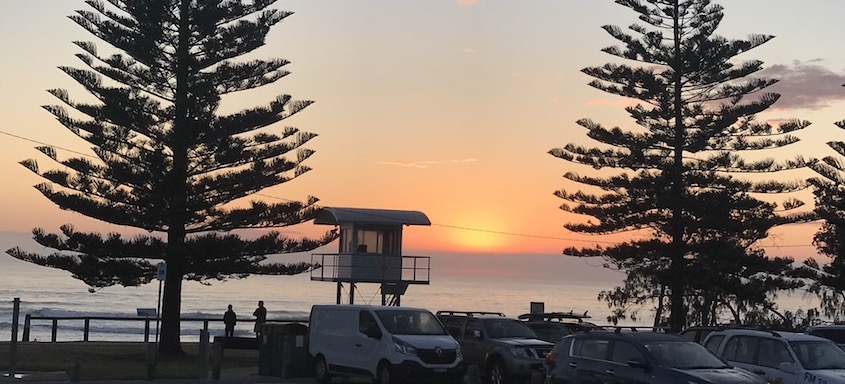
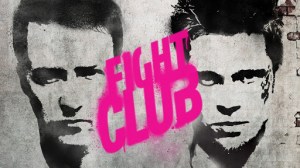 When I was asked if I’d like to join ‘fight club’ at 5.45am on Wednesdays I was curious for more than one reason. What do they do at fight club? And why is it so important? And what would make them think I could get there if I wanted to? Now I know the number one rule of fight club is you don’t talk about fight club—but I’m going to break it, slightly. For years now, a few blokes have met every week, rain, hail, dark or shine, to pray. That’s right, to pray! To ask God to make a difference. To tune into the creator and sustainer of this universe. To ask their Father in heaven to make a positive impact in the lives of others.
When I was asked if I’d like to join ‘fight club’ at 5.45am on Wednesdays I was curious for more than one reason. What do they do at fight club? And why is it so important? And what would make them think I could get there if I wanted to? Now I know the number one rule of fight club is you don’t talk about fight club—but I’m going to break it, slightly. For years now, a few blokes have met every week, rain, hail, dark or shine, to pray. That’s right, to pray! To ask God to make a difference. To tune into the creator and sustainer of this universe. To ask their Father in heaven to make a positive impact in the lives of others.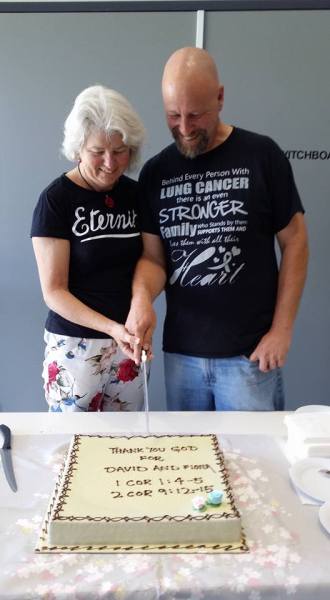 Today marks the end of another chapter of our life—a significant chapter that in many ways has felt like a bonus. Less than five years ago, I believed that my ministry days were done and dusted. I didn’t anticipate preaching again, far less leading a congregation or pastoring a church. Today we received special thanks from our brothers and sisters at Stromlo Christian Church for the past three years of serving among them. I preached my final sermon as lead pastor at Stromlo and later this week we will head away for a few weeks leave before commencing a new role in 2017.
Today marks the end of another chapter of our life—a significant chapter that in many ways has felt like a bonus. Less than five years ago, I believed that my ministry days were done and dusted. I didn’t anticipate preaching again, far less leading a congregation or pastoring a church. Today we received special thanks from our brothers and sisters at Stromlo Christian Church for the past three years of serving among them. I preached my final sermon as lead pastor at Stromlo and later this week we will head away for a few weeks leave before commencing a new role in 2017.